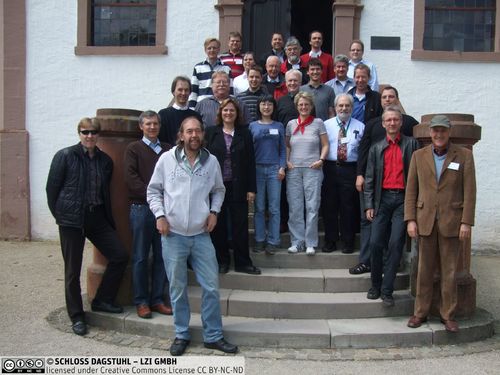Dagstuhl Seminar 11181
Organic Computing – Design of Self-Organizing Systems
( May 01 – May 06, 2011 )
Permalink
Organizers
- Kirstie Bellman (The Aerospace Corp. - El Segundo, US)
- Andreas Herkersdorf (TU München, DE)
- Michael G. Hinchey (University of Limerick, IE)
Contact
- Andreas Dolzmann (for scientific matters)
- Simone Schilke (for administrative matters)
Press/News
Schedule
Organic Computing (OC) has become a challenging vision for the design of future information processing systems: As the systems become increasingly more complex, powerful, cheaper and smaller, our environment will be filled with collections of autonomous systems. Autonomous systems are equipped with intelligent sensors and actuators to be aware of their environment, to communicate, and to organize themselves in order to perform the required actions and services. However, these abilities result in even greater system complexity, which we will not be able to explicitly design and manage in every detail, nor are we able to anticipate every possible configuration. Nevertheless, these services have to be as robust, safe, flexible, and trustworthy as possible. In particular, a strong orientation of these systemstowards human needs – as opposed to a pure implementation of the technologically possible – is absolutely central.
So far, the OC community, mainly driven by the priority research program of the German Research Foundation (DFG), successfully proposed and - at least partially - established a common nomenclature and terminology for terms like emergence, self-organization, selfadaptation, robustness and flexibility within an interdisciplinary research community.
Quantitative metrics for emergence and self-organization were introduced and applied. Observer controller structures have been established as a common architectural pattern for OC systems within a wide spectrum of applications ranging from traffic control, to Systems on Chip, to collaborative robot systems, to wireless sensor networks. Roles and applicability of different types of supervised and reinforcement-based technical learning techniques were investigated and adapted to OC needs.
Despite the progress in understanding the implications and exploiting the potentials of the OC paradigm, a number of key challenges and research questions still remain. In particular, the planned 2011 OC seminar shall shed light on the various notions of design within the OC context. Design in the classical sense follows a hierarchical top-down constraint propagation starting from a purely functional specification. All eventual environmental influences and disturbances have to be anticipated by the designer at “design time”. Due to this anticipatory nature the resulting system is rigid and not able to sufficiently react to run time events.
Complex systems in nature often develop bottom-up due to the self-organizing capabilities of their components. Each component and the system as a whole react to the demands of the environment. In doing so, they are guided by the principles to survive as an individual (selfishness) and the necessity to co-operate (altruism). In technical life-like OC systems we must provide some control by a higher-level entity (finally the user) guiding the bottom-up decisions of the components into a globally desirable direction. In this way, the former topdown design process dissolves into a balanced run-time negotiation between top-down constraints and bottom-up opportunities. The ultimate consequence of this would mean a total replacement of the design process (at design-time) to controlled self-organization (at runtime).
The 2011 OC seminar was held to answer questions resulting from this shift from design-time to run-time. Is OC a realistic or even desirable vision? How can we replace rigid human designtime control by self-adaptive run-time control without stifling the creativity of the emergent bottom up processes? How can we balance top-down control and bottom-up emergence? Beyond these theoretical questions it is a goal of the seminar to define a number of concrete OC demonstrators - or even a common demonstrator - to be pursued in the sequel.
- Michael Beigl (KIT - Karlsruher Institut für Technologie, DE) [dblp]
- Kirstie Bellman (The Aerospace Corp. - El Segundo, US) [dblp]
- Jürgen Branke (University of Warwick, GB) [dblp]
- Uwe Brinkschulte (Goethe-Universität - Frankfurt a. M., DE)
- Sven Brückner (Soar Technology Inc. - Ann Arbor, US)
- Yuriy Brun (University of Massachusetts - Amherst, US) [dblp]
- Jörg Hähner (Universität Augsburg, DE) [dblp]
- Andreas Herkersdorf (TU München, DE) [dblp]
- Michael G. Hinchey (University of Limerick, IE) [dblp]
- Wolfgang Konen (FH Köln, DE)
- Robert Laddaga (Doll Inc. - MA, US)
- Chris Landauer (The Aerospace Corporation - Los Angeles, US) [dblp]
- Falk Langhammer (Living Pages Research GmbH - München, DE)
- Erik Maehle (Universität Lübeck, DE) [dblp]
- Christian Müller-Schloer (Leibniz Universität Hannover, DE) [dblp]
- Phyllis R. Nelson (Cal Poly - Pomona, US)
- Gabriele Peters (FernUniversität in Hagen, DE) [dblp]
- Marco Platzner (Universität Paderborn, DE)
- Franz J. Rammig (C-LAB - Paderborn, DE)
- Paul Robertson (Doll Inc. - MA, US)
- Hartmut Schmeck (KIT - Karlsruher Institut für Technologie, DE) [dblp]
- Ingo Scholtes (Universität Trier, DE) [dblp]
- Bernhard Sick (Universität Kassel, DE) [dblp]
- Jürgen Teich (Universität Erlangen-Nürnberg, DE) [dblp]
- Emil Vassev (University of Limerick, IE)
- Laurenz Wiskott (Ruhr-Universität Bochum, DE) [dblp]
- Rolf P. Würtz (Ruhr-Universität Bochum, DE)
- Johannes Zeppenfeld (TU München, DE)
- Junmei Zhu (European Bioinformatics Institute - Cambridge, GB)
Related Seminars
Classification
- artifical intelligence
- robotics / data structures
- algorithms
- complexity / mobile computing / modelling
- simulation / networks / semantics
- formal methods / soft computing
- evolutionary algorithms / software engineering / interdisciplinary
Keywords
- Organic Computing
- Self-Organization
- Trustworthy System Design
- Adaptivity


